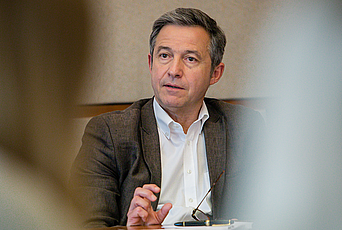Since March, the world resembles a disaster movie. For their plot, screenwriters follow a proven model: scientists warn about a threat—an earthquake, a volcano, a virus, a meteor, or a terrorist attack; politicians ignore the warning because of ignorance, stupidity, or opportunism; when the disaster occurs, some heroes save the day. Accustomed to this model, we have difficulties to reconcile ourselves with the fact that the screenwriters of the drama, in which we have found ourselves as actors and audience at the same time, have yet to make their minds: will there be a happy ending? And is this a feature movie or the first season of a series?
2020 was a remarkable year, by any standards. We saw how the pandemic, as every crisis, served as a magnifying glass for characters and behaviors, highlighting the greatness, self-sacrifice, and responsibility of some and the shallowness, egoisms, and irresponsibility of others. The cautious words of scientists, who have the honesty and courage to say "perhaps" and "I don’t know," competed with the uncontrolled circulation of conspiracy theories, half-truths, and lies through the social media. Scientists, who measure time in decades and centuries, were on a collision course with politicians, for whom only the time between elections counts. The conflict between science and religious groups of every denomination brought us back to the Dark Ages. We saw states with federal structures unable to co-ordinate measures. The European Union of cacophony failed both to implement a uniform policy against the pandemic and to assume a leading role in a world that urgently needs the leadership of democratic states and not of autocracies. We saw the President of the United States of America undermining both international organizations and trust in the most elementary function of a democracy: a free election. We saw more clearly than ever the supremacy of the new Great Powers that have replaced hegemonic states—Amazon, Facebook, and Google. We are in the brave new world of carpe Amazon, Facebook ergo sum, in google veritas, and dum tweet spero. We saw the world resisting the simple truth that there are no local solutions for global problems such as climate change, hunger, poverty, migration, and, now, a pandemic.
All this is remarkable but not new. History has often seen pandemics and epidemics with large numbers of victims, the collapse of democratic institutions, the success of conspiracy theorists, the conflict between religion and science, and the rise and fall of autocratic, corrupt, and populist leaders. The truly new phenomenon in 2020 that makes it a turning point in world history is the fact that for the first time so many people, all over the world, have spent and will continue spending so much time in front of a screen. The screen of the computer or the smartphone has become the stage of interpersonal contacts, scientific exchange, education, artistic expression, culture, entertainment, and protest. It is as if the globe has taken the shape of a two-dimensional screen—the quadrature of the sphere, as it were. The truly unprecedented phenomenon—unprecedented in these dimensions—is the addiction of hundreds of millions of people to the illusions that unavoidable emerge, when cyberspace replaces the physical space as the stage of life.
I am referring to the illusion that the cyberspace is a universal popular assembly, when in fact it only is the cheap substitute for real political participation; the illusion of access to data, when algorithms, subject to manipulation, determine the result of internet searches; the illusion of freedom of speech in a virtual forum in which trolling is protected by anonymity; the illusion of information, when the circulation of fake news is uncontrolled; the illusion of playing, when human contact is missing; the illusion of teaching, when a teacher is unable to bend over the shoulder of a student struggling to deal with an exercise; the illusion of social relations with hundreds of "friends" that one knows through manipulated photos and filtered news. Addicted to the cheap virtual substitutes of togetherness, we are afraid to accept the fact that the occasional pain of loneliness and loss is an intrinsic part of the human condition.
There are good chances that 2020 will be remembered not as a date but as a symbol, like 1984 or 9/11. Its greatest winners are the internet and the social media. Not unlike any other achievement of human inventiveness, the internet can be used for good or for bad. How such a powerful medium is used depends on the awareness and the critical thought of its users; ultimately, it depends on education. The continually increasing and unstoppable dependence on the internet should be outbalanced by interaction in physical spaces. More than anywhere else, this is needed in education. Education requires physical spaces where characters and personalities are shaped through the interaction among three-dimensional people. If 2020 has taught us something, it is that nothing can really replace teaching, lecturing, and exchanging ideas with the physical presence of those who are engaged in this interaction. It should be a top priority of all relevant authorities and institutions to make this possible, now and in the future. Today, more than ever, investment in education, from the kindergarten to the highest level of research-oriented academic teaching—investment by state institutions and private sponsors alike—is an investment without risks and with a guaranteed payback.


